Where to Eat in Paris: Rue du Nil
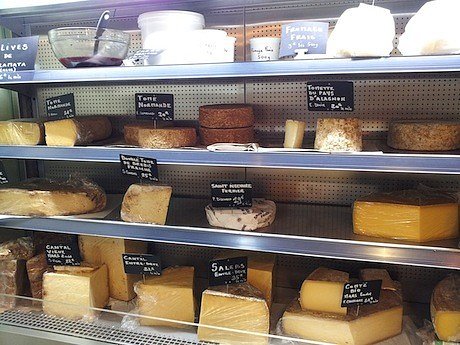
Wed 20 Nov 2013
When was the last time you ventured to the rue du Nil in the 2nd Arrondissement? Ages ago because you’ve given up trying to score a table at Frenchie? Unless you’ve been living under a rock, you would have heard of Gregory Marchand’s latest addition to his collection of restaurants, Frenchie to Go. But there’s much more on this quiet street, and if you’re wondering where to eat in Paris, the rue du Nil seems to have metamorphosed into a foodie hangout.
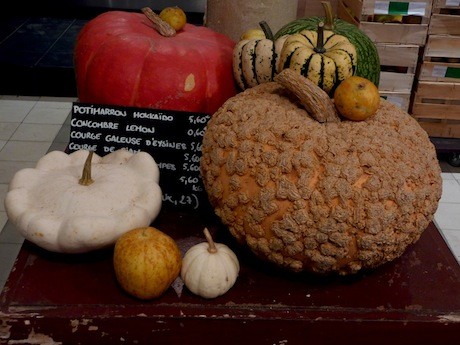
Unusual squashes from Terroirs d’Avenir.
But first, Frenchie to Go. It’s yet another café/restaurant riding on the wave of the Anglo-Saxon food trend that’s hit Paris, but here they pride themselves on doing most everything from scratch. Sweets like muffins, doughnuts and scones, the choucroute and slaw and even ginger beer are made in-house; the pastrami for the Reuben sandwich is cured on the premises; while breads are from Du Pain et des Idées and Gontran Cherrier.
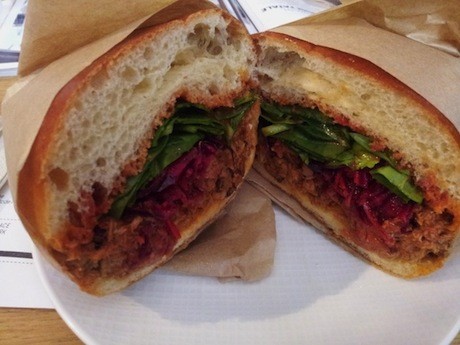
Pulled-pork sandwich at Frenchie to Go.
Breakfast is served all day but it was for the savories that I had come. Pastrami on rye (€14), Reuben with Keen’s cheddar (€12), pulled pork (€10), fish-and-chips with line-caught hake (€14), hot dog (€10) or lobster roll (€22)? I settled on the pulled pork as it’s still relatively hard to come by in Paris. I felt the meat lacked a kick, but everything screamed freshness otherwise, and the stringy fries ordered as a side were faultless. You’ll have to decide if it’s worth the prices, and you’ll have to battle the expats and tripists, but I would at least give the Reuben a try.
Next, skip opposite to l’Arbre a Café, where you can leave whatever preconceived notions you might have about coffee at the doorstep. This little boutique is the brainchild of Hippolyte Courty, who single-mindedly pursues quality and terroir in the gourmet coffee he offers.
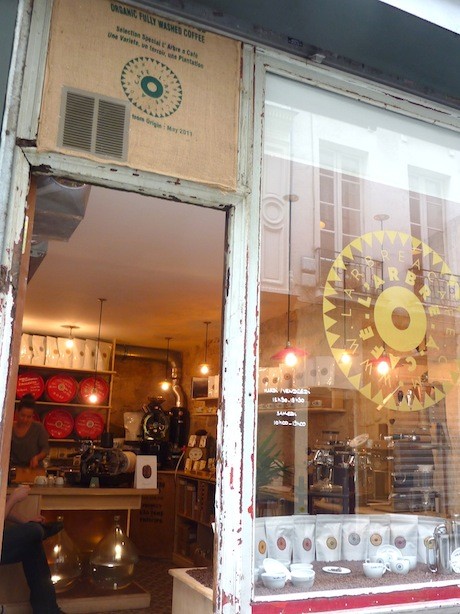
L’Arbre à Café.
Don’t even utter “house blend”—the single-origin single-harvest grains, roasted in-house, are sourced directly from small producers with limited parcels and harvests. Some of the signature coffees that you won’t find elsewhere include the Jacu Bird coffee from Brazil. This is the same concept as kopi luwak, except unlike the civet cats, which are now mostly bred and force-fed coffee beans, jacu birds live in the wild. As you can imagine, this makes for very rare coffee (a harvest of only a few hundred kilos per year). Rarer still is the Bourbon Pointu coffee from the island of Réunion. This variety of coffee, one of the oldest in the world, had all but been abandoned because of its fragility and low yield. Only recently have the plantations on the Piton des Neiges mountain been delicately coaxed back into production, with support by l’Arbre à Café.
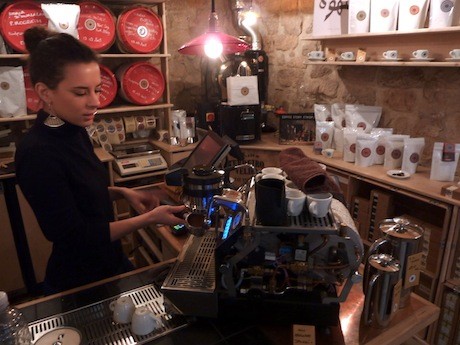
Gourmet coffee at l’Arbre à Café.
The espressos I sampled blew me away with their purity of taste. Aroma, mouthfeel, finish—all your wine appreciation terms click right into place, and why should they not? Coffee, done right, is every bit a product of terroir. L’Arbre à Café used to supply only choice restaurants and pastry chefs (Pierre Hermé, for example), but with the opening of this boutique, coffee aficionados can now buy directly (prices start at €11–14 for 250 grams) or even pop by for an espresso (€3). It also sells teas and Claudio Corallo chocolates. Friendly staff member Emmanuelle is passionate about the products.
Don’t put away that shopping bag (and wallet). Still to explore is Terroirs d’Avenir, a grocer, fishmonger and butcher. Terroirs d’Avenir was started by two young French chaps, Alexandre Drouard and Samuel Nahon. Inspired by the Slow Food movement, they had been crossing the country and beyond in search of quality produce by small producers and supplying more than 50 of the top restaurants in Paris, but more than a year ago, set up shop to sell directly to consumers.
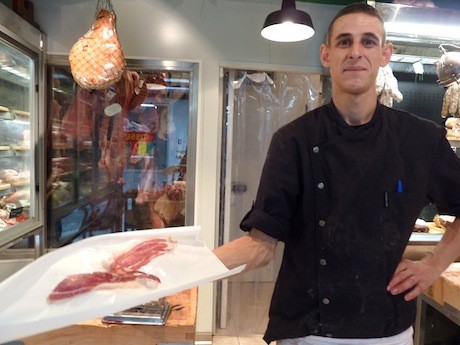
Jambon noir de Bigorre at Terroirs d’Avenir.
Seasonal hard-to-find vegetables such as choux de Pontoise, red potatoes from Flanders, lemons from Sicily; fish direct from Saint-Jean-de-Luz and l’Ile d’Yeu; meats such as jambon de Paris (the real McCoy) and jambon noir de Bigorre—all are available not just for top chefs but for anyone, and not at the stratospheric prices you might imagine. And do not even think of going away without getting some of the cheese!
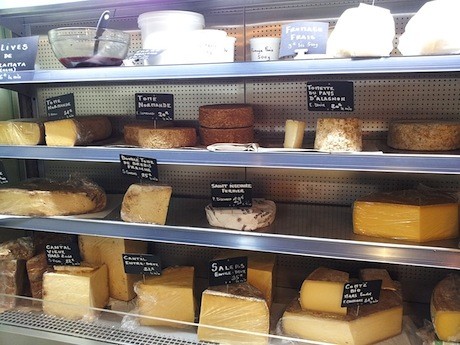
Excellent artisan cheese at Terroirs d’Avenir.
If that’s not reason enough to do your shopping here, it’s always good to chat with the knowledgeable staff. After all, it’s not often that you can quiz someone who’s on a first-name basis with the producers. The first time I went, more than a year ago, there was even a merry little party of fishermen at the shop.
So don’t let the drabness of the rue du Nil put you off. Things have been astir for quite a while on this little street. There’s a sort of industry chumminess as people hop in and out of their restaurants and shops. Now you have reason to go, even during the day!
Pro tip: You can take Girls’ Guide with you on your handheld! Our website, digital magazine and walking trips are all available for your mobile device.
Info/Related Links
Frenchie to Go
9, rue du Nil, in the 2nd Arrondissement.
Open Tues–Sat, 8:30 a.m.–4:30 p.m.
L’Arbre à Café
10, rue du Nil, in the 2nd Arrondissement.
Open Tues–Fri, 12:30 p.m.–7:30 p.m.; Sat, 10 a.m.–7 p.m.
Terroirs d’Avenir
6, 7, 8, rue du Nil, in the 2nd Arrondissement.
Open Tues–Sat, 10 a.m.–9 p.m. (closed 2:30 p.m.–4:30 p.m., except on Sat); Sun, 10 a.m.–2 p.m.